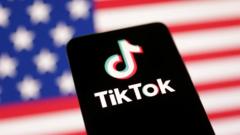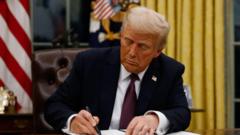In a pivotal moment for social media and free speech, TikTok is appealing to the US Supreme Court in a decisive battle to overturn a proposed ban that threatens its operation in the country. This legal confrontation hinges on the balance between national security concerns and the First Amendment rights of TikTok's 170 million American users.
TikTok Challenges US Ban in Supreme Court: A Clash of Free Speech and National Security

TikTok Challenges US Ban in Supreme Court: A Clash of Free Speech and National Security
TikTok's final confrontation with the US Supreme Court tests the intersection of user rights and federal security measures.
TikTok's legal team is set to make their case on Friday, seeking to challenge a law enacted last year mandating the separation of the app from its Chinese parent company, ByteDance, by January 19 or face a total ban from the US market. The US government maintains that TikTok poses a serious threat, potentially allowing the Chinese government to surveil American citizens or manipulate its content for political gain. However, TikTok vehemently disputes these claims, asserting that the ban infringes on the free speech rights of its vast user base.
The legal precedent has been shaky at lower court levels, with judges siding with the government's stance. Complicating matters further is the intervention of President-elect Donald Trump, who recently called for a postponement of the law's enforcement to facilitate negotiations. Experts predict that although the Supreme Court's ruling could come swiftly, it remains uncertain whether they will favor TikTok or uphold previous judgements.
The bipartisan legislation, fueled by concerns over user safety and data privacy related to TikTok's association with the Chinese government, is not a blanket prohibition on the app itself but would pressure tech titans like Apple and Google to cease its availability. The platform already confronts bans and restrictions in several countries, including the UK and India.
Supporters of TikTok emphasize the platform's denial of any undue Chinese influence and argue that the proposed law is an unconstitutional affront to free speech. They are asking the Supreme Court either to nullify the ban as a violation of constitutional rights or to halt its implementation while the legislation is scrutinized.
Amidst this legal battle, the issue has garnered both public and political attention, particularly following Trump's evolving stance on the platform, which has led to significant speculation about potential legislative solutions. Proponents of regulating social media, however, remain steadfast in their belief that whatever the outcomes, considerable risks to national security remain.
With public outcry growing among TikTok's user base, many individuals and organizations, including the ACLU, are voicing their concerns about the implications of the ban on free speech. The outcome of this conflict may either empower voices on the app or pave the way for one of the most significant restrictions on digital expression seen in recent history.
As this legal saga unfolds, the nation looks to its highest court to navigate the convoluted dynamics of technology, privacy, and the rights of individuals in the digital age.























